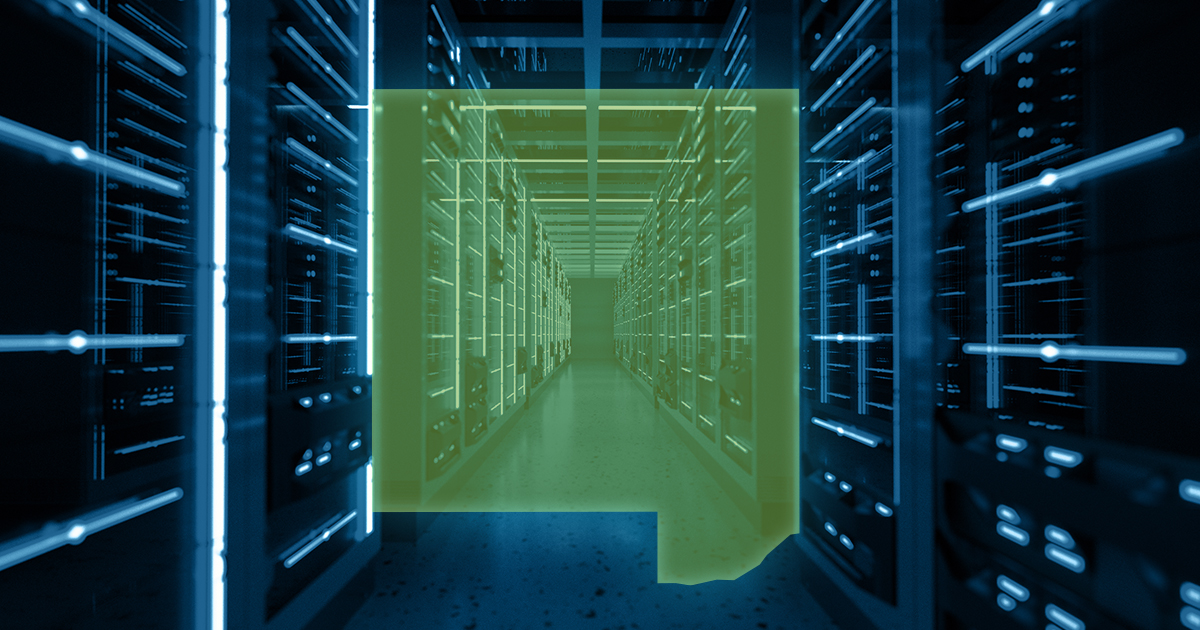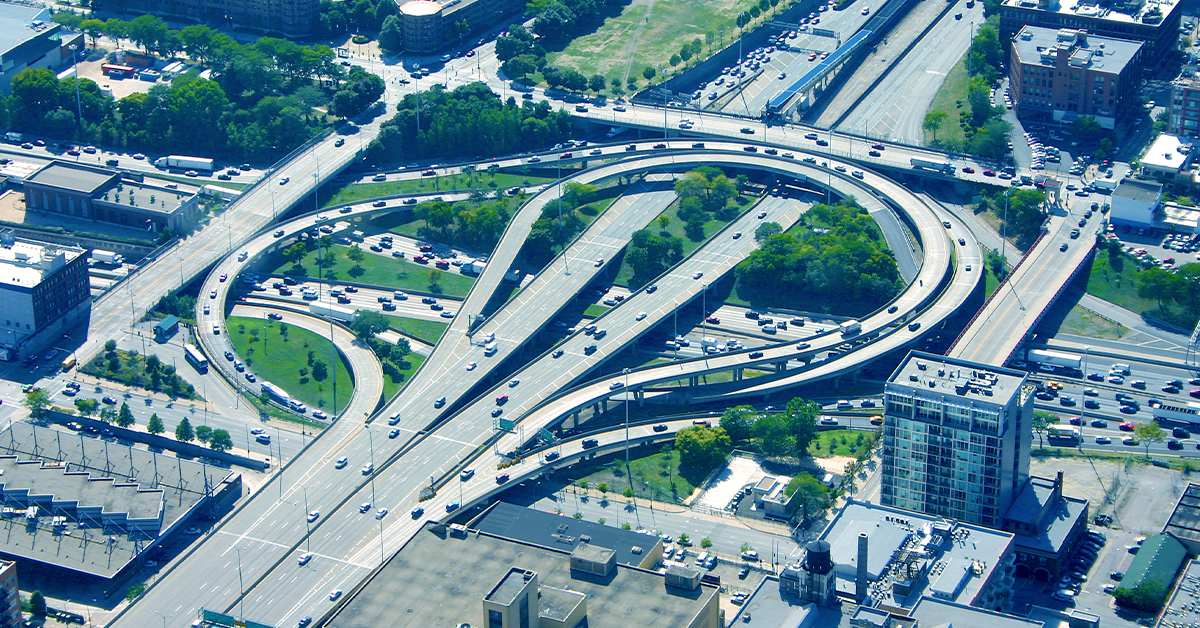When selecting sites for new data centers – facilities that house the computer servers responsible for powering today’s digital networks – companies must search for a ‘Goldilocks zone’ of conditions.
From affordable, reliable energy to a workforce that can keep the equipment running, everything has to be just right.
Now, a recent report ranks the Chicagoland region (including DuPage County) as the world’s second-best market for data centers, just behind Northern Virginia and ahead of the likes of Silicon Valley and Dallas-Fort Worth. Over the past several years, the region has leveraged its existing strategic advantages with new state sales tax incentives to create optimal conditions for data centers, and the world is taking notice.
It’s a data world—we’re just living in it.
Unless you’re in the industry, chances are good that you’ve never actually been inside a data center—most of us haven’t. At the same time, the servers housed in these facilities impact nearly every aspect of our lives.
From the Netflix series we binge on Friday nights to the files we download from our employers’ servers on Monday morning, much of the data we rely on every day is processed and stored within data centers, along with more sensitive information such as proprietary corporate data, financial assets, government files, and medical information. Virtually every modern business and government office relies on vast quantities of data. Data centers house this information, allowing clients to access it quickly and securely.
And data usage is only growing. As we integrate new technologies within our society – more advanced AI, Internet of Things (IoT) devices and 5G service, not to mention Facebook’s recently announced ‘multiverse’ project – we are building a world that is increasingly reliant on data.
Which is to say, a world that is increasingly reliant on data centers.
Today, companies cannot build data centers fast enough. Often, these businesses have clients lined up to use their services before they even break ground. At the same time, data centers are complex investments that require high volumes of capital; the majority of projects cost more than $250 million. With that much money at stake, as well as their client’s trust and security, companies are understandably picky when it comes to where they invest in new data centers.

What makes DuPage a top choice?
As the demand for real-time data transmission reaches an all-time high, the DuPage region has emerged as a prime location for data centers. A recent report from Cushman & Wakefield names the Chicagoland region (including DuPage) as the second-best market for data centers globally. That ranking comes as, over the past five years, DuPage has seen a 3.4% growth in data centers, with more projects in the works.
What makes the DuPage region a leading choice for data centers boils down to a mix of strategic advantages, including:
- State and local tax incentives. Due to 2019 legislation, qualifying Illinois data centers are exempt from paying state and local taxes on equipment over a 10-year period, making the state a major draw for the sector. The same legislation provides a tax credit of 20% of wages paid to construction workers for projects located in underserved areas, spurring economic growth within these communities.
Experts say that these tax incentives – which make Chicago one of the most affordable national markets for data centers – will cause an uptick in leasing activity, as major cloud companies invest in the area. Illinois is also one of a few states that does not assess a personal property tax, another financial advantage.
While this incentive draws companies to the Chicagoland region, DuPage has the additional advantage of low property and sales taxes.
- Access to affordable, reliable and renewable energy. “Every business relies on energy, but for data centers it’s mission critical,” said Ed Sitar, Manager of Economic and Business Development at ComEd, which provides electric power to the Chicagoland region.
To host and protect their clients’ assets, data centers depend on having access to energy at all times. And since these businesses require large volumes of energy, they need that power to be not only reliable, but affordable and clean.
ComEd, which is ranked among the top 10% of energy companies in the nation for performance reliability, provides highly reliable energy for customers at a rate that is among the most competitive in the U.S.
In addition, Illinois has the sixth-lowest electricity-generated carbon emissions in the country. Businesses here can obtain 100% renewable energy options through the competitive supply market, helping them reach their sustainability goals.
Illinois, already the sixth-largest wind energy-producing state, recently passed legislation that sets the state on a path for 100% renewable energy by 2050. - “Free cooling.” One of the greatest challenges of operating a data center is keeping servers cool. These devices are running all day, every day, and they tend to overheat. Due to the DuPage region’s northern climate, companies can pump outside cold air into their facility for much of the year, enabling them to cut back on energy usage. This gives the region an advantage over other popular markets in warmer climates.
- An extensive fiber network. Data centers rely on a robust infrastructure of fiber optics, as well as other utilities. While facilities in other locations, particularly rural areas, often have to build this infrastructure from the ground up, DuPage already has it—enabling tech companies to reduce the time and cost of construction and get their facility running sooner.
- Access to a massive talent pool. DuPage has a large and diverse talent pool living and working within the community. Many local companies also draw talent from Chicago, which is right next door. An extensive public transportation system makes commuting to and from the city easy.
- Access to a highly skilled and diverse construction workforce. Building a data center is complicated and labor-intensive, requiring a large local workforce with specialized skills. And, as demand for data services grows exponentially, projects tend to run on a tight timeline.
As regions across the nation experience labor shortages – particularly in construction – many lack the skilled workforce needed to complete these projects quickly and efficiently.
DuPage is a different story. The region is home to the International Brotherhood of Electrical Workers (IBEW) Local 701 and the DuPage JATC, a joint apprenticeship training program between the National Electrical Contractors Association (NECA) and the IBEW. Through this collaboration, professionals are equipped with the latest construction techniques in state-of-the-art training environments. In turn, contractors can draw on this highly skilled labor to build the next generation of data centers.
“DuPage is fortunate to have a strong union labor-management collaboration including world-class training centers, where contractors have access to building trades persons who learn the latest construction techniques,” said Dan Allen, Executive Director of the Construction Industry Service Corporation (CISCO). “As a result, the data centers are built to precise specifications to house these mission-critical components. The availability of skilled union contractors, the skilled union workforce that they employ, and next generation of electrical workers currently being trained, puts DuPage County in a most favorable position to continue to attract these types of projects for years to come.” - A minimal risk of natural disasters. In many regions, floods, hurricanes, wildfires, earthquakes, and other natural disasters pose a serious threat to data centers – which often contain sensitive, irreplaceable data – a threat that is expected to intensify in the coming decades. A centrally located community in Northeastern Illinois, DuPage offers a safe location with a minimal risk of natural disasters.
- Desirable amenities. DuPage features a beautiful network of nature parks, a thriving cultural and arts scene, and world-class dining and entertainment, as well as attractive living spaces and nationally ranked schools. These amenities help local companies attract and retain high-caliber talent.
- A global transportation network. Three nearby international airports – O’Hare, Midway and the DuPage Airport – plus several major highways, make it easy for staff and clients to travel to and from practically anywhere in the world. In addition, DuPage is offering businesses unprecedented access to O’Hare through the Western Access Initiative.

How do data centers benefit our communities?
DuPage offers a number of benefits for the owners and operators of data centers, but how do data centers benefit DuPage?
While data centers are often criticized for failing to bring large numbers of permanent jobs to communities, that hasn’t been the case in DuPage—and it likely isn’t the whole story in other communities that are home to these facilities.
The majority of data centers in DuPage employ 25 to 100 full-time workers; in order to receive Illinois’ state and local tax breaks on equipment, centers must employ at least 20 full-time workers and the jobs must pay at least 120% of the given county’s median wage. And studies show that these high-paying jobs often generate many more jobs within the community.
According to a 2018 study by research firm RTI International, data center jobs have a ‘multiplier effect’ on the local workforce: “For every one data center worker, there were five jobs supported elsewhere in the economy by operating expenditures—after the surge in jobs caused by capital expenditures.” (This study was funded by Facebook and focused on its U.S. data center fleet. Its findings were consistent with a different 2018 study funded by Google and focused on European markets.)
In other words, data centers generate long-term job growth within communities, well beyond the construction contracts and other short-term jobs related to the initial investment. According to the RTI report, every $1 million spent on data center operations supports 13 jobs elsewhere in the economy.
Beyond creating jobs, data centers inject millions of dollars into the local economy through taxes—property taxes, but especially water and utility. In a February 2021 Sun-Times article, Lauren Huffman, spokesperson for the Illinois Department of Commerce and Economic Opportunity, said the state’s incentive programs have already generated more than 370 jobs and $4.5 billion in private investment. (Read more about the impact of data centers on local economies here.)
“DuPage is good for data centers, and data centers are great for DuPage,” said Ron Lunt, Founding Partner of development company Hamilton Partners.
In early 2021, NTT Ltd., one of the world’s largest information-technology companies, opened their U.S. Data Center Campus at Hamilton Partner’s Hamilton Lakes Business Park. Located in Itasca at the intersection of the new Elgin O’Hare Expressway (I-390) and I-355, the park is a 15-minute drive from Chicago’s International Airport. In addition to office space, the campus features the Westin Hotel, the Hamilton Lakes Athletic Club, a daycare center, nature paths, and various restaurants.
“They employ our people, they fund public projects, they invigorate our local economy, and, importantly, they help us continue to attract further investment. DuPage is emerging as a global hub for innovative companies and talented people, and data centers play a key role.
“These are forward-thinking companies—they’re always looking to the near- and long-term future. And when they look at DuPage, they see an environment that has everything they need to build this future.”

ABOUT DUPAGE COUNTY, ILLINOIS
Just west of Chicago, DuPage County is a diverse, innovative community offering a strategic location, a collaborative environment, a diverse culture, beautiful parks and trails, a vibrant arts scene, excellent schools, responsible local governance, and world-class workplaces.
Want to learn more? Take a look at our list of The Top DuPage Workplaces of 2021, dive into the history of the I-88 Corridor, or learn how global industry leader Ball Horticultural is literally coloring our world from DuPage County.



